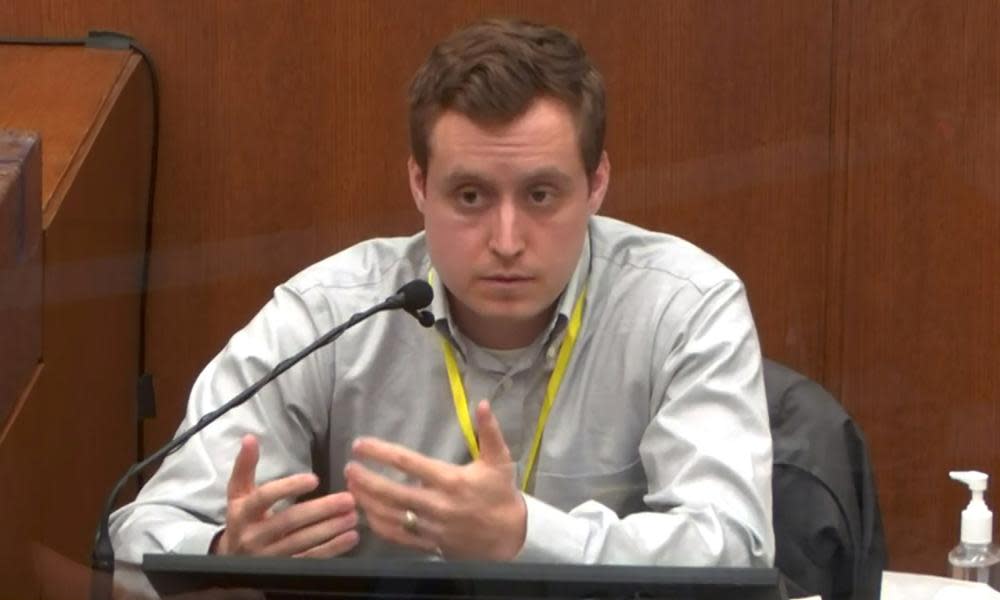Doctor who tried to save George Floyd says asphyxia was likely cause of death

- Oops!Something went wrong.Please try again later.
- Oops!Something went wrong.Please try again later.
The emergency room doctor who tried to save George Floyd’s life told the Derek Chauvin murder trial on Monday he concluded the 46-year-old Black man most likely died of asphyxiation.
Related: Minneapolis ‘on edge’ over outcome of Derek Chauvin trial, Ilhan Omar says
The Minneapolis chief of police, Medaria Arradondo, also began to give evidence against Chauvin, who he fired shortly after Floyd’s death.
Prosecutors said in their opening statement that Arradondo will say Chauvin used “excessive force” in the arrest that ended in Floyd’s death in May last year, and that his conduct was “not consistent” with Minneapolis police training. On Monday, they began by leading the chief through his lengthy career and experience.
It is highly unusual for a police chief to give evidence against one of his own officers. Chauvin, 45, has denied charges of second- and third-degree murder, and manslaughter. He faces up to 40 years in prison if convicted of the most serious charge. Three other officers face charges.
Floyd’s death last year reinvigorated the Black Lives Matter movement and prompted mass protests for racial justice across the US and other parts of the world.
Dr Bradford Wankhede Langenfeld aid on the sixth day of the trial he saw no evidence Floyd was killed by a heart attack or a drug overdose, as Chauvin’s defence has claimed in attempting to deny that the death resulted from the officer keeping his knee on Floyd’s neck for more than nine minutes.
There was no report that the patient complained of chest pain or was clutching his chest
Dr Bradford Wankhede Langenfeld
Langenfeld, who declared Floyd dead, told the court there was not a heartbeat “sufficient to sustain life” and that he believed cardiac arrest was brought on by “lack of oxygen”. He was asked by the prosecutor if there was another term for that.
“Asphyxia,” said Langenfeld.
The doctor said he thought a heart attack was unlikely because when he cut open Floyd’s chest he saw no evidence of that. He also said the paramedics who brought him to the hospital said Floyd showed no behaviour typical of the condition.
“There was no report that the patient complained of chest pain or was clutching his chest,” he said.
The state medical examiner found that Floyd’s death was caused by “cardiopulmonary arrest”, which the prosecution says is a broad enough term that can be applied to any death because it means only that a person’s heart and lungs have stopped.
The defence claims the finding means Floyd died of a heart attack.
Langenfeld told the court a delay in treating Floyd, particularly giving him CPR, may have reduced his chance of survival. Ambulance paramedics reported that the police made no effort to give Floyd medical assistance even though he had passed out and was unresponsive by the time they arrived on the scene.
Langenfeld said every minute of delay in providing CPR reduces the prospect of saving a patient in cardiac arrest by 10% to 15%. Other witnesses have told the trial the police did not treat Floyd even after he appeared to pass out and that it was only when the paramedics arrived that he received medical attention.
Langenfeld also said the paramedics did not mention the possibility of a heart attack or drug overdose as a likely cause of his condition when they handed the patient over.
The doctor attempted to revive Floyd for about 30 minutes but said he was not able to get his heart to beat on its own at any point and concluded that he could not be saved.
Related: George Floyd's girlfriend shared his opioids pain – Derek Chauvin refused to see it
Chauvin’s lawyer, Eric Nelson, questioned Langenfeld about the possibility that drug use contributed to Floyd’s condition and whether he had administered Narcan, a brand name of naloxone, a common antidote for opioid overdoses.
Langenfeld said he had not, and that Narcan is of no use once a patient has gone into cardiac arrest.
Before Arradondo began testifying, the judge, Peter Cahill, expressed concern at the number of police witnesses still to be called to testify about Chauvin’s use of force, which includes an inspector who the prosecution told the judge will say officers are not trained to place a knee on a person’s neck during arrest.
Cahill said he would permit that and some other witnesses, but not a parade of officers giving similar evidence.
“We’re done with asking other officers about the use of force,” said the judge.

